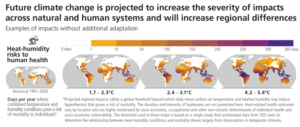A heat wave is a prolonged period of excessively hot weather, typically accompanied by high humidity. These events can have severe impacts on human health, infrastructure, agriculture, and the environment. Heat waves occur when high-pressure systems stall over a region, trapping hot air underneath and preventing it from dissipating.
The effects of heat waves on people can be wide-ranging and potentially life-threatening. Heat-related illnesses such as heat exhaustion and heatstroke can occur when the body’s temperature regulation mechanisms become overwhelmed.
Various measures can be implemented to mitigate the impacts of heat waves and protect public health:

1.Heat Health Warning Systems:
Implementing heat health warning systems allows authorities to alert the public when extreme heat events are forecasted. These warnings can trigger actions such as opening cooling centers, adjusting work hours for outdoor workers, and providing transportation to heat-vulnerable individuals.
2.Heat-Resilient Infrastructure:
Ensuring that critical infrastructure such as power grids, transportation systems, and water supply networks are resilient to extreme heat events is essential for minimizing disruptions and protecting public safety.
3.Cooling Centers:
Establishing cooling centers in communities where vulnerable individuals can seek relief from the heat is essential. These centers are typically located in public buildings such as libraries, community centers, and schools, and provide air-conditioned spaces and water for hydration.
4.Urban Planning and Green Spaces:
Urban areas are particularly susceptible to the heat island effect, where concrete and asphalt absorb and retain heat, leading to higher temperatures compared to rural areas.
5.Community Engagement and Social Support:
Mobilizing community organizations, volunteers, and social support networks to check on vulnerable individuals during heat waves can save lives. This includes providing assistance with transportation, delivering essential supplies, and offering social support to those in need.
6.Public Awareness Campaigns:
Educating the public about the risks of heat waves and providing information on how to stay safe during extreme heat events is crucial. This includes advising people to stay hydrated, avoid strenuous outdoor activities during peak heat hours, and seek shelter in air-conditioned spaces when necessary.
7.Building Regulations:
Implementing building codes that require the use of energy-efficient materials and designs can help reduce indoor temperatures during heat waves. This includes proper insulation, ventilation, and the use of reflective roofing materials to minimize heat absorption.
Government schemes aimed at addressing heat waves and promoting public health include:

Healthcare Provision:
Ensuring that healthcare facilities are prepared to handle an increase in heat-related illnesses during extreme heat events is crucial. This includes training healthcare workers to recognize and treat heat-related conditions and ensuring sufficient medical supplies and resources are available.
National Disaster Management Authority (NDMA):
Implements heatwave-specific guidelines and protocols to assist states in managing heatwave-related emergencies.
Pradhan Mantri Ujjwala Yojana (PMUY):
Provides clean cooking fuel to rural households, reducing the reliance on solid biomass fuels that contribute to indoor heat.
National Action Plan on Climate Change (NAPCC):
Includes provisions for adaptation and mitigation measures to combat the adverse effects of climate change, including heatwaves.
Moving forward, governments need to prioritize investments in climate-resilient infrastructure, promote sustainable urban planning, and enhance community resilience to heatwaves through targeted interventions. Collaboration between governments, civil society organizations, and the private sector is essential for implementing effective heatwave management strategies and safeguarding public health and well-being.







